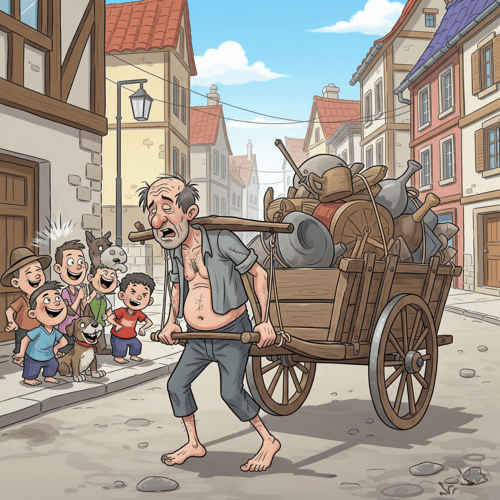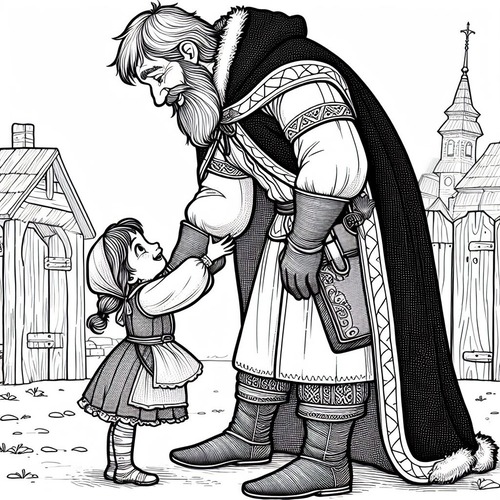‘My Yoke is Easy and My Burden Light’: What Did Jesus Really Mean?
Every honest Christian has felt the tension. Jesus promises His “yoke is easy” and His “burden is light” (Matthew 11:30), yet He also commands us to “take up your cross daily and follow me” (Luke 9:23). He offers rest for the weary, but warns us “in this world you will have trouble” (John 16:33). If following Christ means an easy yoke, why do faithful believers face persecution, suffering, and the daily battle against sin?
This isn’t a contradiction to explain away—it’s a profound truth to understand. Is there a compelling answer that honours both Christ’s gracious promise and the sobering reality of Christian discipleship? Let’s find out.
UNDERSTANDING CHRIST’S PROMISE
When Jesus spoke these words in Matthew 11:28-30, He was addressing people crushed under an unbearable weight. The Pharisees had turned God’s law into a suffocating system of rules that “bind heavy burdens, hard to bear” (Matthew 23:4). Regular people couldn’t keep up with endless regulations about ritual washing, Sabbath observance, and ceremonial purity. They were spiritually exhausted, trying to earn God’s favour through perfect performance.
Into this crushing legalism, Jesus offers something radically different: “Come to me, all who labor and are heavy laden, and I will give you rest. Take my yoke upon you, and learn from me, for I am gentle and lowly in heart, and you will find rest for your souls.”
The key lies in understanding what makes His yoke “easy.” The Greek word chrestos doesn’t mean effortless—it means well-fitting, kind, and gracious. Like a skilled craftsman who carves a yoke to fit perfectly without chafing, Christ offers a yoke tailored by divine grace. It’s “easy” not because it demands nothing, but because it provides everything needed.
Consider the fundamental difference: under the law, we work desperately for God’s acceptance, never knowing if we’ve done enough. Under grace, we work joyfully because of God’s acceptance, already secured by Christ’s finished work. As John writes, “His commandments are not burdensome” (1 John 5:3)—not because they’re simple, but because they flow from love rather than fear.
THE REALITY OF CHRISTIAN SUFFERING
Yet Jesus never promised a trouble-free life. He explicitly warned His followers to expect opposition: “If they persecuted me, they will also persecute you” (John 15:20). Paul adds that “all who desire to live a godly life in Christ Jesus will be persecuted” (2 Timothy 3:12). The Christian life involves genuine hardship.
Our suffering can take multiple forms. There’s external persecution for righteousness’ sake—the world’s hostility toward those who live by different values (Matthew 5:10-12). There’s internal spiritual warfare—the daily battle against indwelling sin and the flesh (Romans 7:15-24). And there’s general human suffering—sickness, loss, disappointment, and death in a fallen world (Romans 8:22).
But this suffering serves divine purposes. It produces perseverance, character, and hope (Romans 5:3-4). It conforms us to Christ’s image (Romans 8:29). It demonstrates God’s power through human weakness (2 Corinthians 4:7). And it prepares us for “an eternal weight of glory beyond all comparison” (2 Corinthians 4:17).
RESOLVING THE PARADOX
So how do we reconcile the easy yoke with the call to suffer? The answer lies in understanding what each represents.
The “easy yoke” describes our fundamental relationship with God. Through faith in Christ, we’re justified—declared righteous and fully accepted. The crushing weight of earning salvation is lifted forever. We’re no longer slaves trying to please a harsh master, but children learning from a loving Father. The yoke connects us to Christ Himself, who bears the load with us.
The “cross” describes our experience in this fallen world as we grow in holiness. Sanctification involves real struggle—mortifying sin, enduring persecution, and living counter-culturally. But even this struggle is transformed by grace. We’re not fighting alone or in our own strength.
John Calvin captured this beautifully: Christ’s yoke is easy “not because it exacts no labour from us, but because He helps us to bear the burden.” The same Spirit who raised Jesus from the dead empowers our obedience (Romans 8:11). Our burdens become bearable because Christ shares them.
Consider the difference between carrying a heavy load alone versus sharing it with someone stronger. The weight doesn’t disappear, but the experience transforms completely. This is why Paul could write, “I can do all things through him who strengthens me” (Philippians 4:13) while simultaneously describing his many sufferings.
LIVING THE EASY YOKE
This understanding transforms how we approach Christian living. We don’t minimise real suffering or promise false prosperity. But we also don’t despair in trials, knowing our fundamental acceptance with God remains secure.
The yoke is easy because we’re yoked to Christ. When we face persecution, He who was “despised and rejected” walks beside us. When we battle sin, He who “was tempted in every way” provides strength. When we serve others sacrificially, He who “came not to be served but to serve” enables our love.
We find rest even in our labor because we’re working from acceptance, not for it. Our efforts flow from gratitude, not anxiety. Our obedience springs from love, not fear of punishment. As the Westminster Shorter Catechism declares, our chief end is to “glorify God and enjoy Him forever”—even through suffering.
THE EASY BURDEN
The paradox resolves when we understand Jesus transforms the very nature of our burdens. What the law made crushing, grace makes bearable. What seemed impossible alone becomes possible in union with Christ. What felt like condemnation becomes sanctification.
Christ’s yoke isn’t easy because it eliminates difficulty—it’s easy because it provides divine resources for every challenge. His burden isn’t light because it costs nothing—it’s light because He paid everything and now supplies all we need.
In a world that promises easy lives but delivers empty burdens, Jesus offers something far better: a meaningful burden made bearable by infinite grace. His yoke may not eliminate our crosses, but it transforms them from crushing weights into instruments of glory.
‘MY YOKE IS EASY’: RELATED FAQs
Did Jesus’ original audience understand the yoke metaphor differently than we do today? Absolutely. In first-century Palestine, yokes were primarily training tools, not punishment devices. Young oxen were paired with experienced ones to learn proper ploughing technique—the older ox bore most of the load while teaching the younger. Jesus’ audience would have immediately grasped He was offering to be their partner and teacher, bearing the heavy end of the yoke while they learned. This makes His promise even more intimate than our modern understanding often captures.
- How do we explain the apparent contradiction between “easy yoke” and passages like “narrow is the way” (Matthew 7:14)? John Owen and other Puritans distinguished between the essence of the Christian life and its experience. The way is narrow because few choose Christ and holiness requires constant vigilance against sin. But Owen argued the yoke remains easy because the Spirit provides power for what seems impossible to the flesh. Similarly, Martyn Lloyd-Jones taught the “narrowness” refers to exclusivity (few find it) rather than difficulty for those who do—Christ Himself is both the narrow gate and the easy yoke.
- What did John Calvin specifically mean when he said Christ “helps us to bear the burden”? Calvin emphasised Christ doesn’t remove our duties but transforms how we perform them. In his Institutes, he explains believers receive a “double grace”—justification (which removes condemnation) and sanctification (which provides power for obedience). The yoke is easy not because the commands disappear, but because the Holy Spirit works within us both “to will and to work for his good pleasure” (Philippians 2:13). Calvin saw this as the difference between law (external compulsion) and gospel (internal transformation).
How does the Westminster Confession address whether Christians can lose their salvation when facing severe persecution? The Westminster Confession’s doctrine of perseverance (Chapter 17) teaches true believers cannot totally or finally fall away, even under extreme suffering. However, the Confession acknowledges saints may “fall into grievous sins” and “continue therein for a time” during trials. The “easy yoke” provides assurance that Christ’s sustaining power, not human strength, secures our salvation. This was particularly comforting to Reformed believers during periods of persecution in Scotland and England.
- Do Reformed theologians see a connection between the “easy yoke” and predestination? Yes, many Reformed scholars connect Christ’s invitation to the doctrine of effectual calling. John Murray argued those who find Christ’s yoke easy are precisely those whom the Father draws (John 6:44). The yoke isn’t easy for everyone who hears the invitation—only for the elect who are given eyes to see its beauty. RC Sproul taught the “rest” Christ offers is ultimately rest from the futile attempt to save ourselves, which only the regenerate can truly appreciate. This doesn’t make the invitation less genuine, but explains why some find it compelling while others reject it.
- How do modern Reformed pastors counsel Christians who feel Christ’s yoke is anything but easy? Contemporary Reformed leaders like Tim Keller and John Piper emphasise returning to the gospel’s objective reality rather than trusting subjective feelings. When believers feel overwhelmed, pastors remind them the yoke’s “easiness” doesn’t depend on their emotional state but on Christ’s finished work. Kevin DeYoung suggests feelings of burden often indicate we’ve slipped back into performance-based thinking rather than grace-based living. The solution isn’t trying harder but remembering our acceptance with God never wavers, even when our experience feels difficult.
What’s the Reformed view on prosperity theology’s interpretation of the “easy yoke”? Reformed theologians universally reject prosperity theology’s claim the “easy yoke” promises material blessing and physical comfort. John MacArthur argues this interpretation ignores the clear biblical teaching about Christian suffering and turns the gospel into a “health and wealth” scheme. The Westminster Standards distinguish between temporal blessings (which may or may not come) and spiritual blessings (which are guaranteed in Christ). Reformed scholars insist Christ’s promise addresses our spiritual condition before God, not our material circumstances on earth—making it far more valuable than any earthly prosperity could be.
‘MY YOKE IS EASY’: OUR RELATED POSTS
Editor's Pick

The Throne-Room Vision: Who Did Isaiah See?
The scene is unforgettable: Isaiah stands in the temple, and suddenly the veil between heaven and earth tears open. He [...]

The Angel of the Lord: Can We Be Certain It Was Christ All Along?
Throughout the Old Testament, a mysterious figure appears: the Angel of the LORD. He speaks as God, bears God’s name, [...]
SUPPORT US:
Feel the Holy Spirit's gentle nudge to partner with us?
Donate Online:
Account Name: TRUTHS TO DIE FOR FOUNDATION
Account Number: 10243565459
Bank IFSC: IDFB0043391
Bank Name: IDFC FIRST BANK






